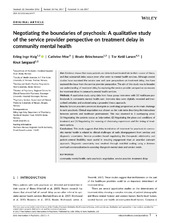| dc.contributor.author | Kvig, Erling Inge | en_US |
| dc.contributor.author | Moe, Cathrine Fredriksen | en_US |
| dc.contributor.author | Brinchmann, Beate | en_US |
| dc.contributor.author | Larsen, Tor Ketil | en_US |
| dc.contributor.author | Sørgaard, Knut W. | en_US |
| dc.date.accessioned | 2018-04-11T09:08:24Z | |
| dc.date.available | 2018-04-11T09:08:24Z | |
| dc.date.issued | 2017 | |
| dc.Published | Kvig EI, Moe CF, Brinchmann B, Larsen TK, Sørgaard KSO. Negotiating the boundaries of psychosis: A qualitative study of the service provider perspective on treatment delay in community mental health. Early Intervention in Psychiatry. 2017 | eng |
| dc.identifier.issn | 1751-7885 | |
| dc.identifier.issn | 1751-7893 | |
| dc.identifier.uri | https://hdl.handle.net/1956/17596 | |
| dc.description.abstract | Aim: Evidence shows that many patients are detected and treated late in their course of illness, and that substantial delay occurs even after entry to mental health services. Although several studies have examined the service user and carer perspectives on treatment delay, few have explored the issue from the service provider perspective. The aim of this study was to broaden our understanding of treatment delay by exploring the service provider perspective on reasons for treatment delay in community mental health services. Methods: A qualitative study using data from focus group interviews with 33 healthcare professionals in community mental health care. Interview data were digitally recorded and transcribed verbatim, and analysed using a grounded theory approach. Results: Service providers perceived divergent or conflicting perspectives as the main challenge in early psychosis. Clinical negotiation was chosen as the main term describing the interactions between patients and healthcare professionals: This was observed in 3 overlapping areas: (1) Negotiating the patients status as help‐seeker; (2) Negotiating the place and conditions of treatment and (3) Negotiating the meaning of distressing experiences and the timing of treatment options. Conclusions: This study suggests that delay in initiation of treatment for psychosis in community mental health is related to clinical challenges of early disengagement from services and diagnostic uncertainty. Service providers found negotiating the therapeutic relationship and patient‐centred flexibility more useful in ensuring engagement than an assertive outreach approach. Diagnostic uncertainty was resolved through watchful waiting using a distress‐overload conceptualization in assessing changes in mental state and service needs. | en_US |
| dc.language.iso | eng | eng |
| dc.publisher | Wiley | eng |
| dc.rights | Attribution CC BY-NC | eng |
| dc.rights.uri | http://creativecommons.org/licenses/by-nc/4.0/ | eng |
| dc.subject | community mental health | eng |
| dc.subject | early psychosis | eng |
| dc.subject | negotiation | eng |
| dc.subject | service provider | eng |
| dc.subject | treatment delay | eng |
| dc.title | Negotiating the boundaries of psychosis: A qualitative studyof the service provider perspective on treatment delay incommunity mental health | en_US |
| dc.type | Peer reviewed | |
| dc.type | Journal article | |
| dc.date.updated | 2018-01-23T09:07:34Z | |
| dc.description.version | publishedVersion | en_US |
| dc.rights.holder | Copyright 2017 The Author(s) | |
| dc.identifier.doi | https://doi.org/10.1111/eip.12477 | |
| dc.identifier.cristin | 1545973 | |
| dc.source.journal | Early Intervention in Psychiatry | |

